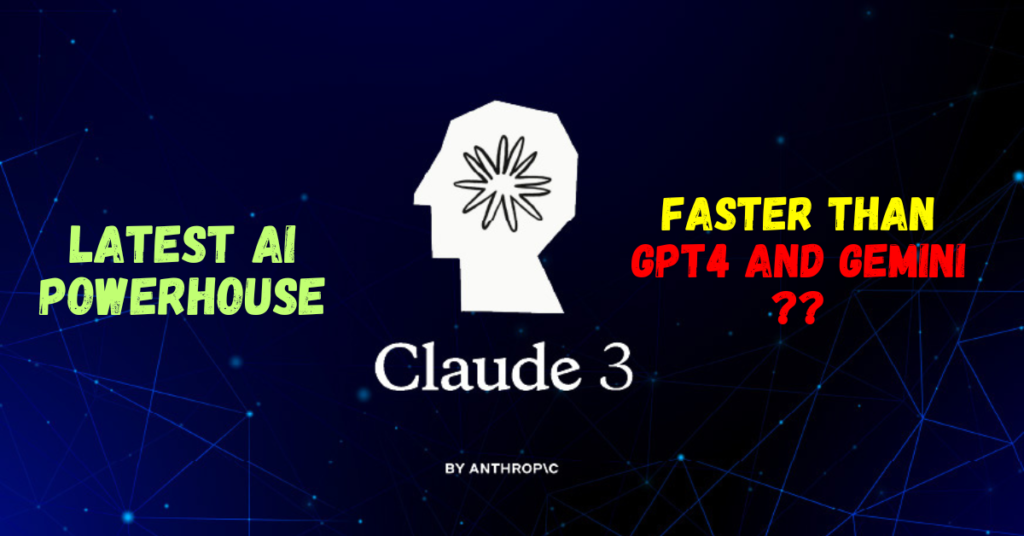Anthropic’s recent unveiling of the Claude 3 model family sent shockwaves through the AI community. This new generation of large language models (LLMs) boasts significant advancements in accuracy, capabilities, and safety practices, setting new industry benchmarks across various tasks. Let’s delve deeper into what makes Claude 3 so revolutionary.

Anthropic Claude 3: Three Models for Every Need
The Claude 3 family comprises three models: Haiku, Sonnet, and Opus. Each model offers a distinct level of capability, allowing users to choose the perfect balance of intelligence, speed, and cost for their specific application.
- Opus: The crown jewel of the family, Opus outperforms both OpenAI’s ChatGPT and Google’s Gemini on common AI evaluation benchmarks. It demonstrates near-human comprehension and fluency on complex tasks, pushing the boundaries of general intelligence.
- Sonnet: This mid-range model offers a significant leap in capabilities compared to previous iterations. It excels at tasks requiring rapid responses, like knowledge retrieval and sales automation, while delivering higher intelligence levels than its predecessors.
- Haiku: Designed for cost-effectiveness and speed, Haiku is the fastest model in its intelligence category. It tackles tasks like information retrieval and research efficiently, making it ideal for a wide range of use cases.
Enhanced Capabilities for Real-World Applications
Beyond raw power, Claude 3 boasts a range of improved functionalities:
- Multi-Step Instruction Following: All three models excel at handling complex, multi-step instructions. This makes them invaluable for tasks requiring precise and nuanced execution.
- Brand Consistency: Businesses can leverage Claude 3 to craft customer-facing experiences that adhere to specific brand voice and response guidelines.
- Structured Output Formats: Claude 3 excels at generating popular structured outputs like JSON, simplifying its use in natural language classification and sentiment analysis tasks.
See More: Unleashing the Power of AI for Small Businesses: A Paradigm Shift
Safety First: Building Trustworthy AI
Anthropic prioritizes safety in its AI development. Claude 3 incorporates several features to ensure responsible and trustworthy use:
- Accuracy at Scale: The models undergo rigorous testing with complex factual questions to identify weaknesses. Claude 3 demonstrates significant improvements in providing accurate answers, reducing incorrect information, and admitting uncertainty when necessary.
- Transparency through Citations: Future iterations of Claude 3 will enable citations within its responses, allowing users to verify answers by referencing specific sources.
- Reduced Refusal Rates: Claude 3 models exhibit a more nuanced understanding of user requests, leading to fewer unnecessary refusals compared to previous generations.
- Mitigating Potential Risks: Anthropic employs dedicated teams to address a broad spectrum of risks, including misinformation, harmful content, and potential misuse of the models.
- Constitutional AI: This innovative approach trains AI assistants to improve safely without human labels for harmful outputs. It promotes transparency and ethical decision-making within the models.
- Reduced Bias: Claude 3 demonstrates significantly less bias compared to its predecessors. Anthropic remains committed to continuous bias reduction to ensure model neutrality.
Safety Protocols and Responsible Scaling
Anthropic adheres to rigorous safety protocols before releasing any model. Their red teaming evaluations confirm negligible potential for catastrophic risks, categorizing Claude 3 within their AI Safety Level 2 (ASL2) framework. This framework outlines the technical and organizational protocols Anthropic implements to manage risks associated with increasingly capable AI systems.
See More: Apple Car: Unveiling the Saga of the cancelled Apple Project Titan
The Future of AI: A Call to Action
The Claude 3 family represents a significant leap forward in AI development. Its advancements in performance, capabilities, and safety pave the way for exciting new applications across various industries. As AI continues to evolve, responsible development practices like those employed by Anthropic are crucial for ensuring a safe and beneficial future for this transformative technology.
Thanks for Visiting Us In Focus!
For DMCA complaints, please visit our DMCA Form / Report Content
Follow us on other platforms as follows:
Facebook – https://www.facebook.com/usinfocus
X (formerly Twitter) – https://twitter.com/usinfocusdotcom